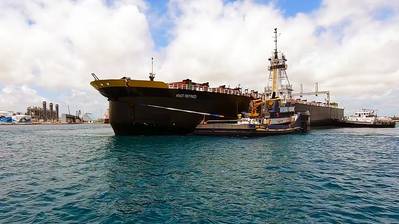New Sugar Barge Enters Service on US East Coast
A newly constructed barge has entered service for American Sugar Refining, Inc., a member of West Palm Beach-based ASR Group, and its parent companies – Florida Crystals Corporation and Sugar Cane Growers Cooperative of Florida. The 450-foot-long Knot Refined departed from the Port of Palm Beach on Friday to deliver Palm Beach County-grown and -milled raw sugar to ASR Group’s Domino Sugar Refinery in New York.
Built by North Kingstown, R.I. shipyard Senesco Marine, the 450-foot-long Knot Refined took more than two years to construct and is the first oceangoing, dry cargo barge of its size built in the U.S. since the early 2000s. With an 18,000-ton capacity, the barge is larger than those previously used, and it is also equipped with improved capabilities and is more sustainable than any vessel used in the past.
The Knot Refined will make approximately 18 round trips per year from the Port of Palm Beach to transport raw sugar primarily to ASR Group’s cane sugar refineries in Yonkers, N.Y. and Baltimore, Md.
“We have relied on third-party barges to transport our raw sugar coastwise since the 1970s,” said Chuck Ferrer, ASR Group’s Sr. Director of Ocean Freight Logistics. “At that time, sugar from Florida Crystals and Sugar Cane Growers Cooperative was sold primarily to trade houses. When the two companies acquired the Yonkers refinery in 1998 then additional refineries in Baltimore and outside New Orleans in 2001, we became fully vertically integrated, but we didn’t control our own domestic freight. We’re excited that now the Knot Refined changes that.”
Florida Crystals and Sugar Cane Growers Cooperative sustainably grow and mill sugarcane in western Palm Beach County and produce raw sugar. Approximately 650,000 short tons of that sugar is shipped annually from the Port of Palm Beach to ASR Group’s refineries through port facilities operated by Florida Sugar & Molasses Exchange, Inc. (FSME). Trucks transport the raw sugar from the Belle Glade and Pahokee mills to FSME’s sugar terminal at the Port, where it is discharged into a 21,000-ton capacity warehouse. Roughly once per week, sugar is loaded onto a barge in a continuous operation at a rate of 700 tons per hour.














